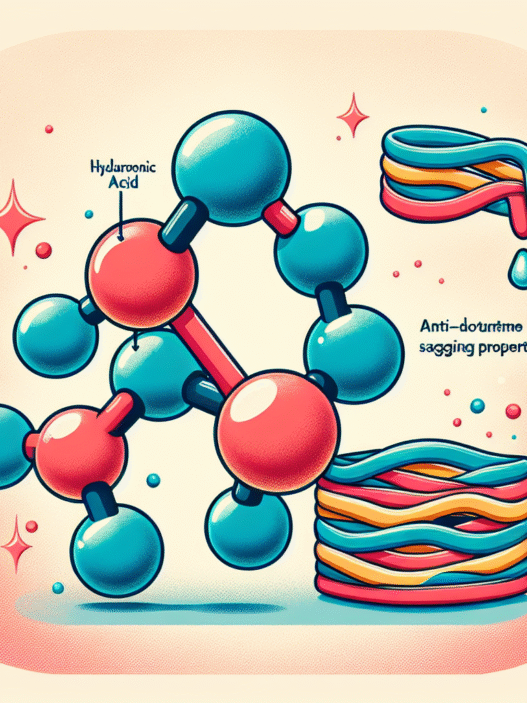Understanding Hyaluronic Acid
Definition and Function of HA
Hyaluronic Acid (HA) is a naturally occurring polysaccharide found in various tissues and fluids throughout the body, especially in the skin. Composed of two disaccharides, it plays a critical role in biological processes, including cell differentiation, inflammatory responses, and wound healing (PubMed Central). One of its most remarkable properties is its ability to bind and retain moisture, as it can hold about 1.5 gallons of water per quarter-teaspoon, making it a vital ingredient in many moisturizing products.
This ability to absorb water is due to its structure, which allows HA to function as a powerful humectant. It holds water molecules onto the skin’s surface, maintaining hydration and preventing transepidermal water loss.
Importance of HA in Skincare
Hyaluronic Acid is essential in skincare, particularly for those looking to enhance hydration and achieve a youthful appearance. With aging, the natural levels of HA in the skin decrease, leading to reduced hydration and skin regeneration capabilities. This decline can result in dryness, fine lines, and a loss of elasticity (Filorga).
Incorporating products containing HA, such as hyaluronic acid serums and hyaluronic acid moisturizers, into a skincare routine can help combat these effects. These products work to restore moisture levels, improve skin firmness, and enhance overall skin texture. Additionally, the use of HA is not limited to facial skincare; it is also beneficial for joint health and can be found in various formulations for both skin and joint applications.
The versatility of HA makes it a go-to ingredient for many beauty and skincare enthusiasts looking to maintain hydration and promote healthy, youthful-looking skin.
Benefits of Hyaluronic Acid
Hyaluronic acid (HA) offers a range of advantages for skin hydration and overall skin health. Understanding these benefits can help beauty and skincare enthusiasts make informed decisions about their routines.
Skin Hydration
One of the most notable benefits of hyaluronic acid is its ability to hydrate the skin. HA is known for its exceptional capacity to retain moisture, pulling water from the environment into the skin. A 2021 study involving 40 females aged 30 to 65 found that applying topical hyaluronic acid twice daily significantly improved skin hydration after six weeks (Medical News Today). Additionally, a 2023 study showed that oral supplementation of hyaluronic acid also enhanced skin hydration, skin tone, and epidermal thickness, indicating its versatility in promoting hydration from both topical and internal sources.
| Method of Application | Results |
|---|---|
| Topical HA | Improved skin hydration after 6 weeks |
| Oral HA | Enhanced hydration, skin tone, and epidermal thickness |
Skin Elasticity
Hyaluronic acid plays a crucial role in improving skin elasticity. It supports the skin’s structural integrity and helps maintain its firmness. Research suggests that HA with a molecular weight between 50 to 1,000 kDa is most effective for enhancing elasticity, with around 130 kDa being particularly beneficial. A study found that treatment with this molecular weight of HA resulted in a 20% increase in skin elasticity after one month. This property makes hyaluronic acid a popular ingredient in products aimed at combating signs of aging.
Wound Healing Properties
Hyaluronic acid is also recognized for its wound healing capabilities. A 2019 animal study demonstrated that a gel containing HA promoted wound healing by preventing bacterial infections and moisturizing the wound. Its ability to regulate inflammation means it can be effectively used for various types of wounds, including minor cuts, severe injuries, and postsurgical scars. This makes HA not only a key player in skin hydration but also a vital component in healing processes.
Hyaluronic acid and skin hydration, along with its benefits in elasticity and wound healing, make it an essential ingredient in many skincare products. For those looking to improve their skin hydration further, consider using a hyaluronic acid serum or hyaluronic acid moisturizer to harness its full potential in daily routines.
Different Forms of Hyaluronic Acid
Hyaluronic acid is available in various forms, each with unique applications suitable for enhancing skin hydration and health. Understanding these forms can help individuals select the best option for their skincare routine or therapeutic needs.
Topical Application
Topical hyaluronic acid is widely used in beauty products due to its effectiveness in retaining moisture and improving skin hydration. Many products, such as serums, creams, and lotions, contain this ingredient. These formulations can significantly enhance overall skin health, flexibility, and elasticity when used consistently (Cleveland Clinic).
Common types of topical applications include:
- Hyaluronic Acid Serums: Concentrated formulations designed to deliver intense hydration directly to the skin.
- Hyaluronic Acid Creams and Lotions: Moisturizers that combine HA with other moisturizing agents for a softer texture.
- Hyaluronic Acid Eye Products: Designed to target dryness around the sensitive eye area.
| Product Type | Purpose |
|---|---|
| Serum | Deep hydration |
| Cream | Moisturizing barrier |
| Eye Product | Hydration for delicate skin |
Oral Supplements
Oral supplements containing hyaluronic acid are growing in popularity for their potential benefits in promoting skin health and hydration from within. Long-term use of these supplements can enhance skin flexibility and elasticity, thereby contributing to overall skin vitality. These supplements are generally considered safe when taken as directed (Cleveland Clinic).
Individuals interested in incorporating these supplements should consult product guidelines and consider the suggested dosages for optimal benefits.
| Supplement Type | Benefits |
|---|---|
| Capsules | Internal skin hydration |
| Powders | Versatile formulation options |
Injectable Fillers
Injectable hyaluronic acid fillers are used in aesthetic medicine to improve skin volume and reduce the appearance of fine lines and wrinkles. These fillers are typically injected into areas of the face where volume has been lost, providing a plump, youthful look. The FDA has approved these injections for various applications, including pain relief in patients with mild to moderate osteoarthritis (Medical News Today).
Injectable fillers provide immediate results while also enhancing moisture content in the skin, which can be beneficial for tissue health and wound healing.
| Injection Type | Use |
|---|---|
| Dermal Fillers | Facial volume enhancement |
| Joint Injections | Osteoarthritis pain relief |
Understanding the different forms of hyaluronic acid—topical applications, oral supplements, and injectable fillers—can aid in selecting the best methods to achieve effective skin hydration and health. For more information on how to incorporate this powerful ingredient into your routine, visit our articles on hyaluronic acid serum and hyaluronic acid benefits.
Effectiveness of Hyaluronic Acid
Studies and Findings
Numerous studies support the benefits of hyaluronic acid (HA) in skincare. A 2023 study examined the impact of oral hyaluronic acid on 123 females of various ages and skin types. Findings indicated that it significantly improved skin hydration, skin tone, and epidermal thickness.
Hyaluronic acid has a remarkable ability to hold approximately 1.5 gallons of water per quarter teaspoon, making it a powerful hydration agent in moisturizing products. Research has shown that molecular weight significantly affects the effectiveness of HA. Studies reveal that hyaluronic acid with molecular weights between 50 to 1,000 kDa yields the best results, with 130 kDa demonstrating a notable increase in skin elasticity by 20% within one month. Groups treated with both 50 and 130 kDa HA reported substantial improvements in wrinkle depth and skin roughness after 60 days (Healthline).
| Molecular Weight of HA | Skin Benefits |
|---|---|
| 5 kDa | Potential for unwanted ingredients penetration; caution advised |
| 50 kDa | Improvement in wrinkle depth and skin roughness |
| 130 kDa | Increase in skin elasticity by 20%; significant improvement in texture |
Recommended Concentrations
When it comes to using hyaluronic acid for improved skin hydration, experts recommend maintaining a concentration below 2%. High concentrations can lead to adverse effects, especially for those with sensitive or compromised skin (Healthline). Low molecular weight HA (5 kDa and below) can penetrate deeply but may also carry unwanted ingredients and bacteria, thus reinforcing the importance of concentration control.
It’s crucial to choose products with optimal molecular weights and concentrations for desired skin benefits. Moreover, the use of a hyaluronic acid serum or hyaluronic acid moisturizer that aligns with these recommendations will enhance the hydrating effects for healthier skin.
For more information on the benefits and uses of hyaluronic acid, check out our articles on hyaluronic acid benefits and hyaluronic acid for skin.
Best Practices for Using Hyaluronic Acid
To maximize the benefits of hyaluronic acid (HA) for skin hydration, it is essential to follow certain best practices. This section provides insights into layering with other ingredients, pairing, and important precautions.
Layering with Other Ingredients
Hyaluronic acid works best when layered with complementary skincare ingredients. By combining HA with other elements, individuals can significantly enhance moisture retention and overall skin health.
Common ingredients to layer with hyaluronic acid include:
| Ingredient | Benefit |
|---|---|
| Ceramides | Helps minimize water loss through the skin’s surface while HA draws moisture from the atmosphere. |
| Glycerin | Another humectant that can amplify the moisture-retaining properties of HA. |
| Niacinamide | Supports the skin barrier and can enhance the effectiveness of HA. |
Layering HA with these ingredients can create a more effective hydration strategy. Applying a hydrating serum containing HA, followed by a moisturizer, ensures that the skin barrier remains intact and healthy.
Pairing Hyaluronic Acid
Pairing hyaluronic acid with specific products can lead to improved skin hydration and benefits. Some effective pairings include:
- Hyaluronic Acid Serum and Moisturizer: Applying a hyaluronic acid serum followed by a hydrating moisturizer helps seal in moisture.
- Hyaluronic Acid and Retinol: While retinol promotes cell turnover and rejuvenation, HA can help counteract dryness associated with retinol use. This combination can maximize anti-aging effects without compromising hydration.
By using these pairings effectively, one can enhance the anti-aging benefits of HA alongside its hydrating properties. For more information on the various benefits of HA, explore our article on hyaluronic acid benefits.
Precautions and Considerations
While hyaluronic acid is safe for most people, it is important to observe certain precautions:
- Skin Type: Individuals with sensitive skin should test new products containing HA to ensure there is no irritation. Over-the-counter hyaluronic acid products are generally considered safe when used as directed (Cleveland Clinic).
- Product Formulation: Choose products formulated for the specific skin type and concerns. Low molecular weight hyaluronic acid is ideal for deep hydration, penetrating deeper layers of the skin.
- Proper Application: Apply hyaluronic acid on damp skin to maximize its ability to draw in moisture. Following up with a moisturizer helps lock in hydration, enhancing its efficacy.
Implementing these best practices can unlock the full potential of hyaluronic acid, improving hydration, skin elasticity, and overall appearance. For further insights on how HA affects skin hydration, check out our article on hyaluronic acid and skin hydration.
Future of Hyaluronic Acid
Hyaluronic acid (HA) continues to be a focal point in skincare research and development. Its profound impact on skin hydration and health has prompted ongoing studies to uncover even more benefits and applications.
Ongoing Research
Recent studies have revealed that hyaluronic acid plays significant roles beyond skincare. For instance, research indicates that HA is found in human embryos, where it may assist in tissue growth and wound healing processes throughout the body (Cleveland Clinic). Ongoing research aims to explore its potential in regenerative medicine and treatments for chronic wounds and joint health.
Innovative formulations are being tested, focusing on varying molecular weights of HA. Different weights can influence absorption and effectiveness in products, optimizing benefits such as hydration and anti-aging effects (PubMed Central).
Potential Developments
As the beauty and skincare industry evolves, products featuring hyaluronic acid are becoming increasingly advanced. Future developments could include:
- Enhanced Formulations: Combining HA with other potent ingredients to boost its hydrating properties.
- Personalized Skincare: Tailoring HA products to individual skin needs, perhaps guided by genetic markers that influence how the skin benefits from HA.
- Advanced Delivery Systems: Utilizing nanotechnology to improve the absorption rate of HA, maximizing its effects on skin hydration and elasticity.
Additionally, different types of hyaluronic acid treatments are being formulated, such as advanced facial treatments that deliver intense moisture and hydration. This innovation could lead to more targeted solutions for issues like dryness and aging.
Versatility in Skincare
The versatility of hyaluronic acid makes it a valuable ingredient across various beauty applications. Its ability to retain over 1,000 times its weight in water helps maintain skin moisture, counteracting signs of aging such as fine lines, wrinkles, and loss of elasticity (Filorga).
HA is used not just in traditional serums and moisturizers but also in injectables, such as fillers that restore facial volume and smooth wrinkles. The popularity of these applications indicates the growing acceptance of hyaluronic acid in comprehensive skincare routines. For those seeking hydration, incorporating a hyaluronic acid serum or hyaluronic acid moisturizer can enhance skin health effectively.
With ongoing research and innovation, the applications of hyaluronic acid in skincare are expected to expand further, providing enhanced solutions for various skin concerns and continuing to support hydration and anti-aging efforts.





















